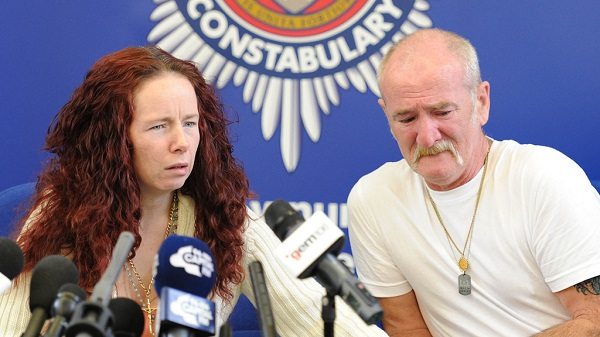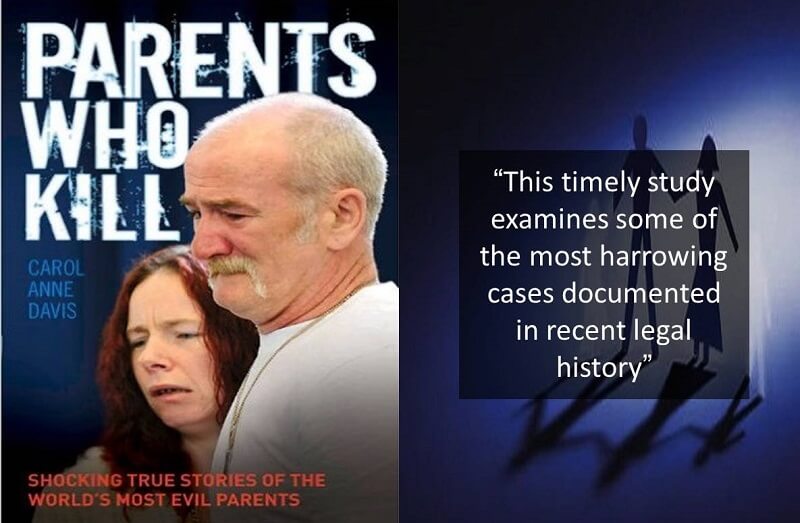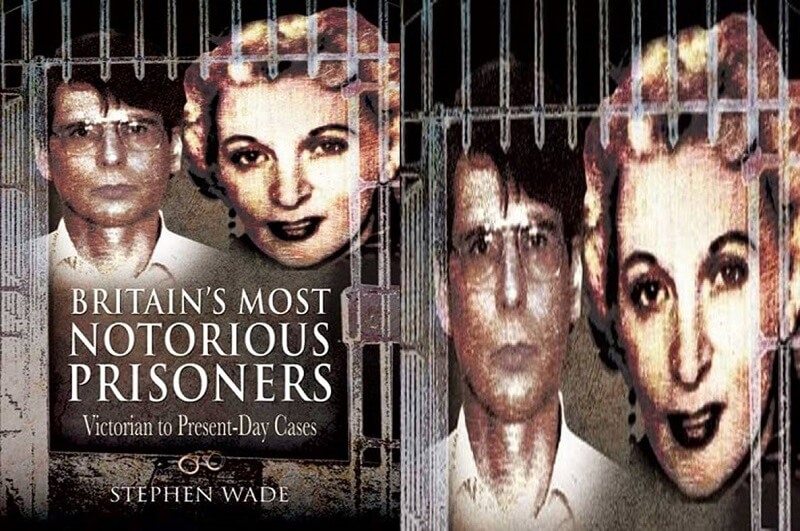To take the life of your own child is beyond a criminal act. It is a violation of the trust a child has in the people they believe in the most; their parents. Children are at more risk from the very people who brought them into this world than anyone else, with the highest number of child homicides being caused by parents. Many are clear intentional acts to end the life of their child. In some cases, it is not just one child but all the children in the household whose lives are taken. The reasons behind such cruelty can vary widely and responsibility extends beyond fathers seeking revenge on mothers by harming their children, but to single mothers, young mothers, and couples acting together.
In Parents Who Kill by Carol Anne Davis, we are taken on a devastating journey through such cases, examining every possible reason that a parent or parents would kill their own children. A book that manages to balance case studies with background information on the psychology of these acts, giving us as readers more insight into how anybody could carry out such a horrific act. In each case, the details are not dwelled on and drawn out. In fact many are quite short, focusing on the key details of the crime. Cases are not poured over with emphasis on the grisly details, they are set in a little background and family history, leading to the murder and then through to the criminal outcome of the case.
Carol Anne Davis has clearly spent time organizing her research into cases of parents who kill. The book itself is separated into four parts and within each part, we read chapter after chapter dedicated to the different underlying causes and motivations behind the murder of biological children. Some cases do leave you wanting more, with a feeling you must now go to Google and type in the parent’s name to find out further details.
Mothers who neglect their children resulting in their deaths, physical abuse from parents, killing for money, and killing for mercy are all covered within Part I of Parents Who Kill. No stone is left unturned in the exploration of the reasons behind such awful and selfish acts. Munchausen’s and Munchausen’s by Proxy are given special attention with Carol Anne Davis seeking the expertise of a University Psychiatry Professor in an attempt to gain a further understanding of this condition.

Some cases are familiar, remembered from news footage at the time the story broke into the public realm. Others are new and somehow did not get reported on or certainly did not receive the same attention as more ‘high-profile cases, despite the same tragedy occurring.
Carol Anne Davis wastes no time delving into some horrific cases starting with young mothers who have hidden their pregnancies, some in the throes of mental illness. Murderous Mothers provides gruesome tales of women giving birth and hiding their babies after taking their lives.
In one frightening case, a British young mother who gave birth while on holiday in New York tried to take her baby’s body back through customs to the UK. This was after she had carried her deceased fetus around in a backpack, while her oblivious boyfriend walked along beside her. Needless to say, there were questions over her state of mind and she reluctantly agreed to a manslaughter charge to enable her to return to the UK and undergo psychiatric treatment.
Interestingly the UK and the US treat such cases quite differently. In the US a lengthy prison sentence for murder is the most common outcome in a case where a mother has committed neonaticide. In contrast, the UK tends to be more sympathetic and considerate of mental illness after childbirth. In the UK the worst sentence that can be received for the murder of your newborn baby is manslaughter.
For some women, such an act is a singular event in their lives that causes them great pain as each year rolls on. For others, however, it is a lifetime of events where they repeatedly give birth and end their babies’ lives before they have had the chance to draw more than a few breaths. The body is hidden and the mother continues with her life as if nothing has happened.
Carol Anne Davis’s style is light and it is concise. There is no rambling, no off-topic discussions, or personal analysis of the mental state of women in each case. True to her many other true crime books (Children Who Kill, Doctors Who Kill, and Couples Who Kill), her writing is fluid and accurate, based on the facts of each case but put together in such a way that makes a riveting read.
Some chapters are short with only a few cases detailed, whereas others are longer going into more background and more detail on the particular cases being examined. In Part II of Parents Who Kill, Fatal Fathers are explored, opening with the case of Mick and Mairead Philpott whose pictures feature on the front cover.
A huge case in the UK in 2012, this is a lengthy chapter discussing the complicated family life of the Philpotts, leading through to the devastating night a decision was made to set fire to the family home. A miscalculated and fatal act, most likely in an attempt to obtain a bigger house and to avoid an impending residency hearing set for the following day. The ferocity and speed at which a fire can spread were clearly underestimated.

All six of the Philpott’s children in the house that night perished in the fire. What makes this case even more tragic is the act put on by the Philpotts to the police, the cameras, and the public. An attempt at sympathy and a mask that this event was a terrible and unexpected tragedy.
The public felt their pain imagining how truly devastating it must be to lose your children in such a way. When it was revealed weeks later that the fire was in fact set by the parents’ own hands, they quickly became targets of a misled and angry British public.
In the last section of Parents Who Kill, Carol Anne Davis provides a reflective yet fact-laden chapter on how some of these cases could have been avoided. What changes could and maybe should take place within society in order to provide better protection for these children?
This book is a collection of case studies where parents have killed their own children but it is also a book that places such cases within the context of the society we live in and examines the various factors involved. A satisfying read for anyone interested in true crime and particularly those keen to explore the motivations behind the tragic cases where individuals have taken the lives of their own children.
You can purchase a copy of Parents Who Kill by Carol Anne Davis at Amazon.
Related Books:- Mindhunter: Inside the FBI’s Elite Serial Crime Unit – “Douglas invented and established the practice of criminal profiling. With the fierce page-turning power of a bestselling novel, yet terrifyingly true, Mindhunter is a true crime classic.”
- Masking Evil: When Good Men And Women Turn Criminal – “Masking Evil examines 37 killers, all were in good solid professions but revealed their hidden capacity for the darkest of crimes.”
- Serial Killers: The Method and Madness of Monsters – Vronsky not only offers sound theories on what makes a serial killer but also provides concrete suggestions on how to survive an encounter with one.



